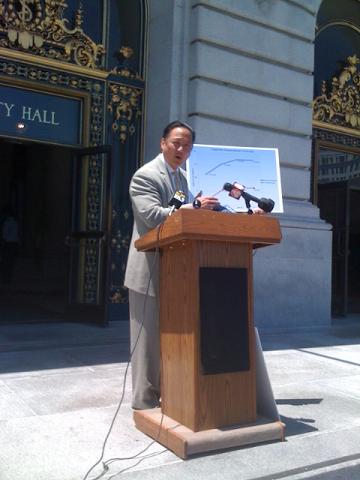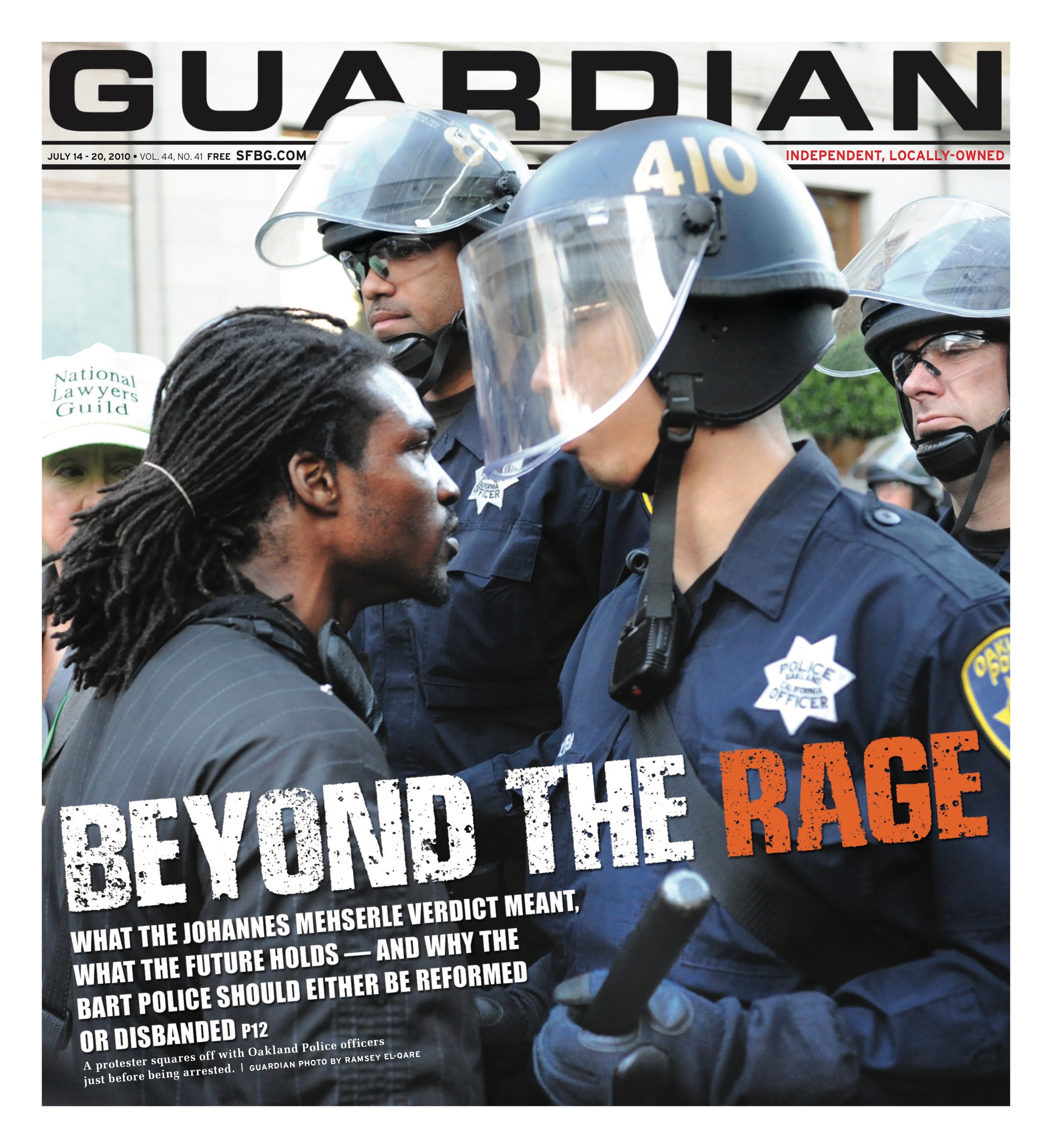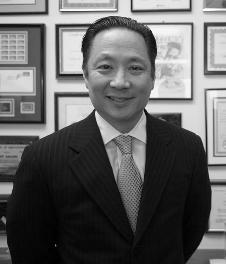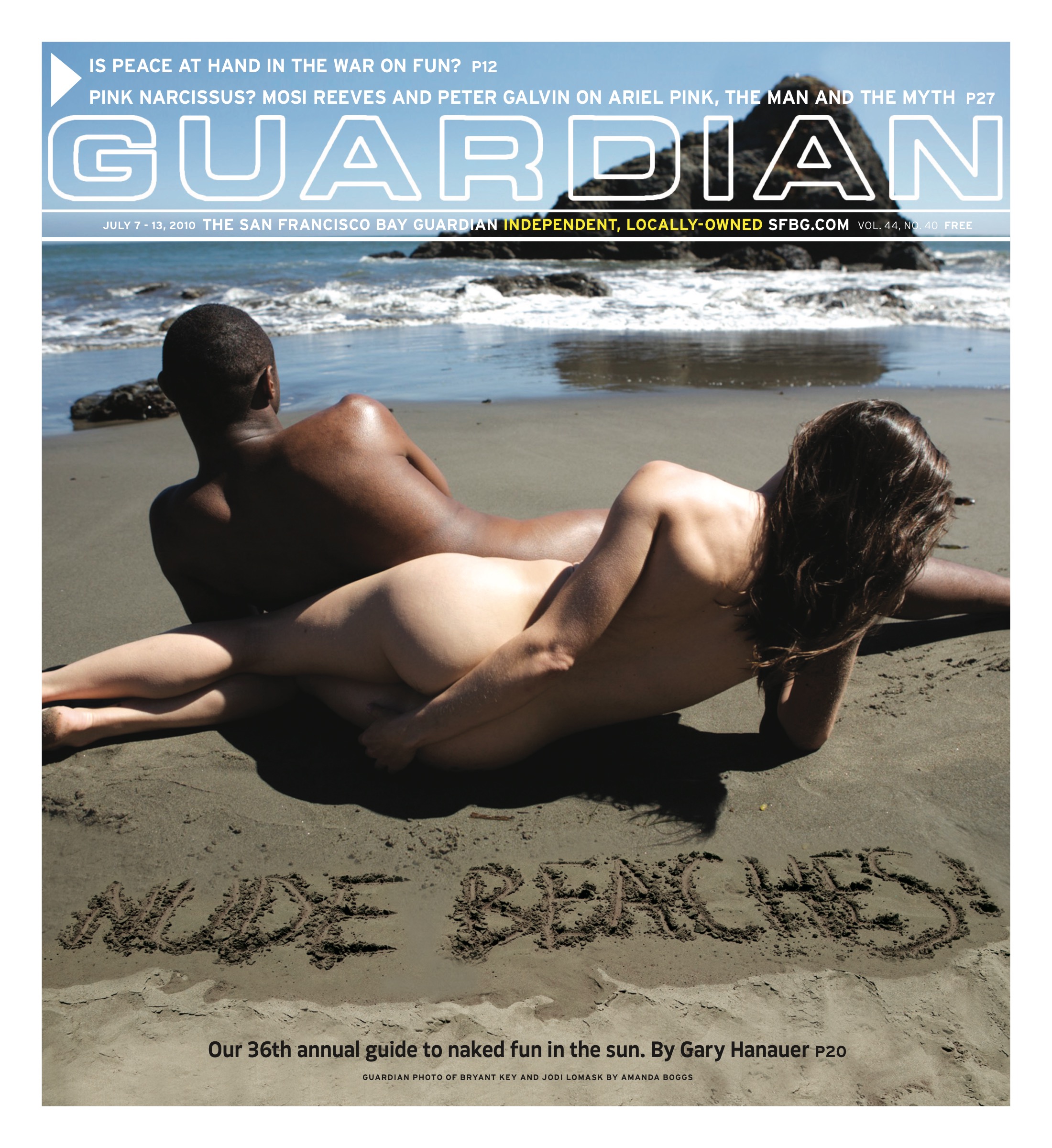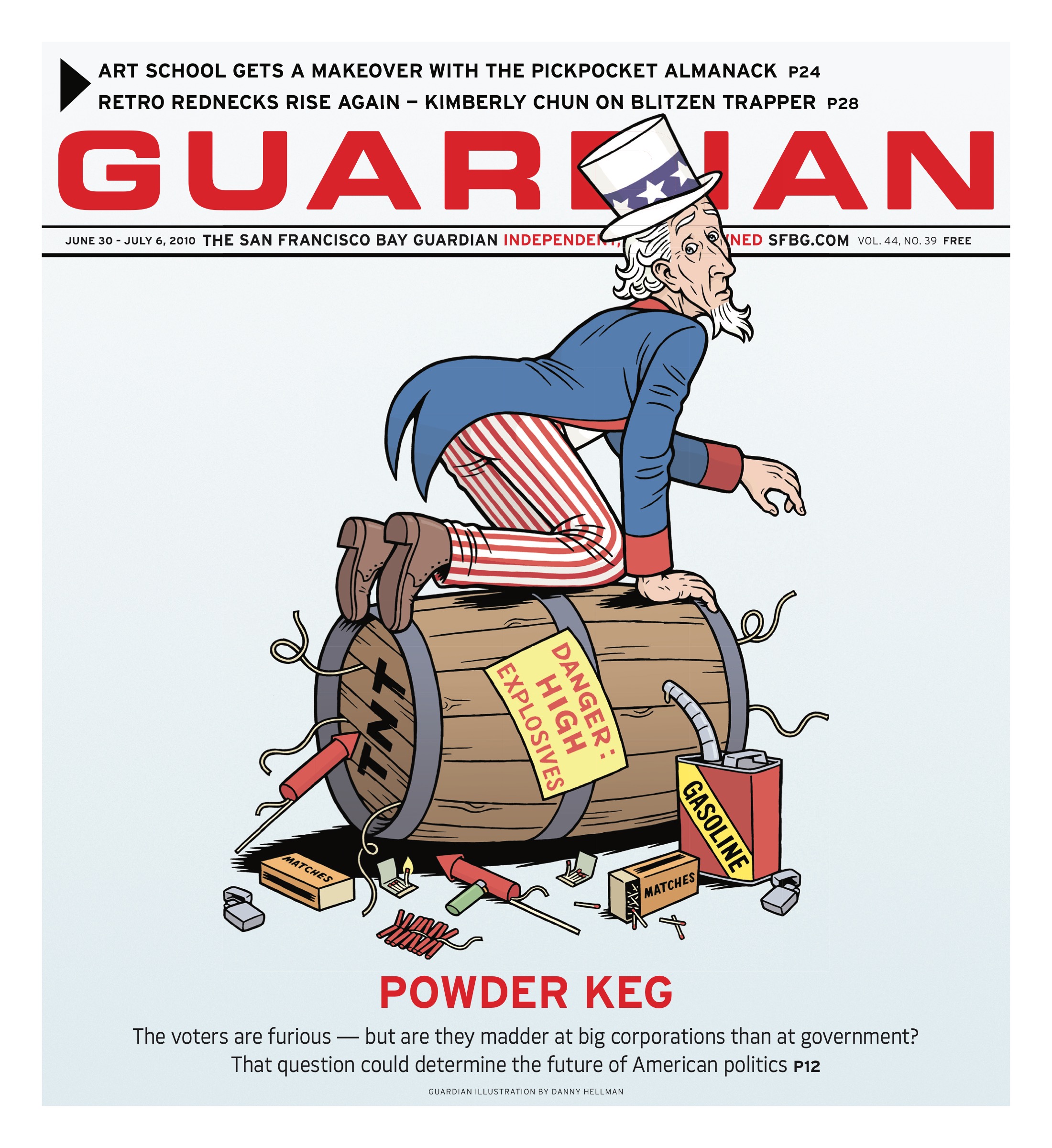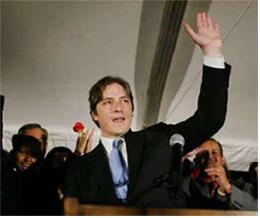Music listings are compiled by Paula Connelly and Cheryl Eddy. Since club life is unpredictable, it’s a good idea to call ahead to confirm bookings and hours. Prices are listed when provided to us. Submit items at listings@sfbg.com.
WEDNESDAY 14
ROCK/BLUES/HIP-HOP
Sean Bonnette, Kepi Ghoulie, Gnarboots Bottom of the Hill. 9pm, $8.
Cellar Door, Shapes Stars Make, Ventid El Rio. 8pm.
Excuses for Skipping, Lovers, Fake Your Own Death Hemlock Tavern. 9pm, $6.
Guitar Shorty Biscuits and Blues. 8 and 10pm, $20.
Bettye LaVette, Milton Great American Music Hall. 8pm, $26.
Rykarda Parasol, Kevin Junior (Chamber Strings), Mark Matos and Os Beaches, Dolly Rocker Movement Café du Nord. 9:30pm, $14.
Raccoons, Red Blue Yellow, Jhameel, Alee Kharim and Science Fiction Knockout. 9:30pm, $7.
Rattlesnakes, Zodiac Death Valley, Electric Sister Elbo Room. 9pm, $6.
Wakey! Wakey!, Wave Array, Doom Bird Hotel Utah. 8pm, $10.
DANCE CLUBS
*Bardot A Go Go Rickshaw Stop. 8pm, $7. Bastille Dance Day Party with DJs Brother Grimm, Pink Frankenstein, and Cali Kid.
Bastille Day on Belden Belden Place between Pine and Bush, SF; www.belden-place.com. 4pm, free. With DJs Pheeko Dubfunk, Jared F, Nima G, and Hakobo.
Booty Call Q-Bar, 456 Castro, SF; www.bootycallwednesdays.com. 9pm. Juanita Moore hosts this dance party, featuring DJ Robot Hustle.
Hands Down! Bar on Church. 9pm, free. With DJs Claksaarb, Mykill, and guests spinning indie, electro, house, and bangers.
Jam Fresh Wednesdays Vessel, 85 Campton, SF; (415) 433-8585. 9:30pm, free. With DJs Slick D, Chris Clouse, Rich Era, Don Lynch, and more spinning top40, mashups, hip hop, and remixes.
Mary-Go-Round Lookout, 3600 16th St, SF; (415) 431-0306. 10pm, $5. A weekly drag show with hosts Cookie Dough, Pollo Del Mar, and Suppositori Spelling.
Mod vs. Rockers Make-out Room. 9pm, free. A Bastille Day dance off.
Open Mic Night 330 Ritch. 9pm, $7.
RedWine Social Dalva. 9pm-2am, free. DJ TophOne and guests spin outernational funk and get drunk.
Respect Wednesdays End Up. 10pm, $5. Rotating DJs Daddy Rolo, Young Fyah, Irie Dole, I-Vier, Sake One, Serg, and more spinning reggae, dancehall, roots, lovers rock, and mash ups.
Synchronize Il Pirata, 2007 16th St, SF; (415) 626-2626. 10pm, free. Psychedelic dance music with DJs Helios, Gatto Matto, Psy Lotus, Intergalactoid, and guests.
THURSDAY 15
ROCK/BLUES/HIP-HOP
Action Design, Hypernova, Yellow Dogs Thee Parkside. 9pm, $8.
Battlehooch, Cash Pony, Wise Wives Bottom of the Hill. 9pm, $10.
Jesse Brewster, Felsen, Luce, Brad Brooks Red Devil Lounge. 8pm, $10.
Built to Spill, Fauxbois Slim’s. 9pm, $26.
Congress with Moon Candy, Mai-Lei, and Ge-ology Coda. 9pm, $10.
Shane Dwight Biscuits and Blues. 8 and 10pm, $16.
Mary Gauthier, Peter Bradley Adams Café du Nord. 8:30pm, $20.
Live Evil Make-Out Room. 5pm, free.
Lords of Acid, My Life With the Thrill Kill Kult DNA Lounge. 9pm, $23.
Part Time, Sam Flax and Higher Color, Bridget St. John, Elisa Randazzo with Robinson, Amy Blaschke Knockout. 9:30pm, $7.
Tippy Canoe and the Paddlemen, Olivia Mancini, AntonetteG Hemlock Tavern. 9pm, $6.
FOLK/WORLD/COUNTRY
Savanna Blu Atlas Café. 8pm, free.
Very Be Careful, Franco Nero, DJs Special Lord B, Ben Bracken, and Phengren Oswald Rickshaw Stop. 8pm, $10.
DANCE CLUBS
Afrolicious Elbo Room. 9:30pm, $5-7. DJs Pleasuremaker and Señor Oz spin Afro-tropical, samba, and funk.
Caribbean Connection Little Baobab, 3388 19th St, SF; (415) 643-3558. 10pm, $3. DJ Stevie B and guests spin reggae, soca, zouk, reggaetón, and more.
Club Jammies Edinburgh Castle. 10pm, free. DJs EBERrad and White Mice spinning reggae, punk, dub, and post punk.
Drop the Pressure Underground SF. 6-10pm, free. Electro, house, and datafunk highlight this weekly happy hour.
Electric Feel Lookout, 3600 16th St, SF; (415) 431-0306. 9pm, $2. With DJs subOctave and Blondie K spinning indie music videos.
Good Foot Som., 2925 16th St, SF; (415) 558-8521. 10pm, free. With DJs spinning R&B, Hip hop, classics, and soul.
Jivin’ Dirty Disco Butter, 354 11th St., SF; (415) 863-5964. 8pm, free. With DJs spinning disco, funk, and classics.
Koko Puffs Koko Cocktails, 1060 Geary, SF; (415) 885-4788. 10pm, free. Dubby roots reggae and Jamaican funk from rotating DJs.
Mestiza Bollywood Café, 3376 19th St, SF; (415) 970-0362. 10pm, free. Showcasing progressive Latin and global beats with DJ Juan Data.
Nightvision Harlot, 46 Minna, SF; (415) 777-1077. 9:30pm, $10. DJs Danny Daze, Franky Boissy, and more spinning house, electro, hip hop, funk, and more.
Peaches Skylark, 10pm, free. With an all female DJ line up featuring Deeandroid, Lady Fingaz, That Girl, and Umami spinning hip hop.
Popscene 330 Rich. 10pm, $10. Rotating DJs spinning indie, Britpop, electro, new wave, and post-punk.
Solid Thursdays Club Six. 9pm, free. With DJs Daddy Rolo and Tesfa spinning roots, reggae, dancehall, soca, and mashups.
FRIDAY 16
ROCK/BLUES/HIP-HOP
Antibalas, Sway Machinery Great American Music Hall. 9pm, $23.
Inquisition, Altar of Plagues, Velnias, Dispirit Elbo Room. 8pm, $14.
Maria Taylor Andy LeMaster, Foolproof Four, Morgan LeMaster Café du Nord. 9:30pm, $10.
Carlton Melton, Nothing People, Hans Keller Hemlock Tavern. 9:30pm, $7.
Mighty Mo Rodgers Biscuits and Blues. 8 and 10pm, $20.
Shabazz Palaces Yoshi’s San Francisco. 10:30pm, $20.
Slowness, Skeletal System, Sunbeam Rd., Nuns of Justice Retox Lounge. 8:30pm, $2.
Struts, Mighty Slim Pickins!, Minks Thee Parkside. 9pm, $10.
Teenage Bottlerocket, Banner Pilot, Complaints Bottom of the Hill. 10pm, $12.
3rdrail, Absent Society, Saint Vernon, Falling to Pieces Slim’s. 9pm, $14.
JAZZ/NEW MUSIC
Audium 9 1616 Bush, SF; (415) 771-1616. 8:30pm, $15.
Black Market Jazz Orchestra Top of the Mark. 9pm, $10.
Chris Brown, Animal Divino Project, Chad McKinney, Joe Salvatore Li Po Lounge. 9pm, $5.
Emily Anne’s Delights Revolution Café, 3248 22nd St., SF; (415) 642-0474. 8:45pm, free.
Pieces of a Dream Yoshi’s San Francisco. 8pm, $16.
FOLK/WORLD/COUNTRY
Broken Glass Beach Coda. 10pm, $10.
Going Away Party Plough and Stars. 9pm, $6-$10.
Quiet Stars Socha Café, 3235 Mission, SF; (415) 643-6848. 8:30pm, free.
DANCE CLUBS
Dirty Rotten Dance Party Madrone Art Bar. 9pm, $5. With DJs Morale, Kap10 Harris, and Shane King spinning electro, bootybass, crunk, swampy breaks, hyphy, rap, and party classics.
Exhale, Fridays Project One Gallery, 251 Rhode Island, SF; (415) 465-2129. 5pm, $5. Happy hour with art, fine food, and music with Vin Sol, King Most, DJ Centipede, and Shane King.
Fat Stack Fridays Koko Cocktails, 1060 Geary, SF; (415) 885-4788. 10pm, free. With rotating DJs Romanowski, B-Love, Tomas, Toph One, and Vinnie Esparza.
Fubar Fridays Butter, 354 11th St., SF; (415) 863-5964. 6pm, $5. With DJs spinning retro mashup remixes.
Club Dragon Club Eight, 1151 Folsom, SF; www.eightsf.com. 9pm, $8. A gay Asian paradise. Featuring two dance floors playing dance and hip hop, smoking patio, and 2 for 1 drinks before 10pm.
Good Life Fridays Apartment 24, 440 Broadway, SF; (415) 989-3434. 10pm, $10. With DJ Brian spinning hip hop, mashups, and top 40.
Hot Chocolate Milk. 9pm, $5. With DJs Big Fat Frog, Chardmo, DuseRock, and more spinning old and new school funk.
Hubba Hubba Revue: Bootie Pirate Show DNA Lounge. 9pm, $10-15. Bootleg mash-ups and buccaneer burlesque.
Noze, Worthy, and Moomaw Mighty. 9pm, $17. Spinning electronica.
Oldies Night Knockout. 9pm, $2-4. Doo-wop, one-hit wonders, and soul with DJs Primo, Daniel, and Lost Cat.
Radioactivity 222 Hyde, SF; (415) 440-0222. 6pm. Synth sounds of the cold war era.
Rockabilly Fridays Jay N Bee Club, 2736 20th St, SF; (415) 824-4190. 9pm, free. With DJs Rockin’ Raul, Oakie Oran, Sergio Iglesias, and Tanoa “Samoa Boy” spinning 50s and 60s Doo Wop, Rockabilly, Bop, Jive, and more.
Some Thing The Stud. 10pm, $7. VivvyAnne Forevermore, Glamamore, and DJ Down-E give you fierce drag shows and afterhours dancing.
TekAndHaus Anu, 43 6th St., SF; (415) 931-7292?. 10pm, $5. With DJ Raíz.
SATURDAY 17
ROCK/BLUES/HIP-HOP
Acephalix, Self-Inflicted, Vaccuum Elbo Room. 5pm, $7.
Bare Wires, Moccretro, Heavy Hills, Family Matters Hemlock Tavern. 9:30pm, $7.
Drink Up Buttercup, I Come to Shanghai Thee Parkside. 9pm, $8.
*Halford Regency Ballroom. 9pm, $40.
Howlin Rain, Sean Smith and the Present Moment, 3 Leafs El Rio. 9pm, $8.
Igor and Red Elvises, Gun and Doll Show Slim’s. 9pm, $15.
Maps and Atlases, Cults, Globes Bottom of the Hill. 10pm, $12.
Sons of Champlin, Electric Flag, Fishbear Fillmore. 8pm, $30.
Stone Foxes, Mata Leon, Strange Vine Café du Nord. 9:30pm, $12.
Sweet Baby Jai Biscuits and Blues. 8 and 10pm, $20.
Ben Taylor, Katie Herzig Bimbo’s 365 Club. 9pm, $18.
JAZZ/NEW MUSIC
Audium 9 1616 Bush, SF; (415) 771-1616. 8:30pm, $15.
Eric Kurtzrock Trio Ana Mandara, Ghirardelli Square, 891 Beach, SF; (415) 771-6800. 8pm, free.
Hillbilly Jazbos Club Deluxe. 10pm, $5.
Pieces of a Dream Yoshi’s San Francisco. 8 and 10pm, $16.
Terry Disley Experience with Erik Jekabson Coda. 7pm, $5.
FOLK/WORLD/COUNTRY
Blue Diamond Fillups Thee Parkside. 11am, free.
Hillbilly Jazzbos Deluxe, 1511 Haight, SF; (415) 552-6949. 10pm, $5.
Ian Luban Socha Café, 3235 Mission, SF; (415) 643-6848. 8:30pm, free.
Makru Revolution Café, 3248 22nd St., SF; (415) 642-0474. 8:45pm, free.
Orquesta lo Clave The Ramp, 855 Terry Francois, SF; (415) 621-2378. 5pm, free.
Robert Gastelum Latin Jazz Amnesia. 6pm, free.
Justin Roberts and the Not Ready for Naptime Players Swedish American Hall (upstairs from Café du Nord). Noon, $15.
DANCE CLUBS
Bar on Church 9pm. Rotating DJs Foxxee, Joseph Lee, Zhaldee, Mark Andrus, and Nuxx.
Bootie: Chernobyl DNA Lounge. 9pm, $6-12. John!John! presents a disaster-themed stage show, plus DJs Adrian and Mysterious D spin mash-ups.
Booty Bassment Knockout. 10pm, $5. Booty-shaking hip-hop with DJ Ryan Poulsen and Dimitri Dickenson.
Cock Fight Underground SF. 9pm, $7. Gay locker room antics galore with electro-spinning DJ Earworm.
Fire Corner Koko Cocktails, 1060 Geary, SF; (415) 885-4788. 9:30pm, free. Rare and outrageous ska, rocksteady, and reggae vinyl with Revival Sound System and guests.
Fringe Madrone Art Bar. 9pm, $5. With DJs Blondie K and subOctave spinning indie music videos.
Full House Gravity, 3505 Scott, SF; (415) 776-1928. 9pm, $10. With DJs Roost Uno and Pony P spinning dirty hip hop.
HYP Club Eight, 1151 Folsom, SF; www.eightsf.com. 10pm, free. Gay and lesbian hip hop party, featuring DJs spinning the newest in the top 40s hip hop and hyphy.
Jump Up to Get the Beat Down Club Six. 9pm, $5. With live performances by All Soul, Makeshift, Sevent Day, Ophrap, and 5th P and DJs Xole and One-Way.
Non Stop Bhangra Rickshaw Stop. 9pm, $15. Live dhol (drum) players, dance performers, and DJs.
O.K. Hole Amnesia. 10pm, $5. With live performances by Bronze, Altars, Jason Greer, and resident DJs C.L.A.W.S., Muscledrum, and Nay Nay.
Party Like It’s 1994 Paradise Lounge. 10pm, $10. With DJs Jeffery Paradise, Richie Panic, Deevice, and more spinning 90’s music.
Prince vs. Michael Madrone Art Bar. 8pm, $5. With DJs Dave Paul and Jeff Harris battling it out on the turntables with album cuts, remixes, rare tracks, and classics.
Rock City Butter, 354 11th St., SF; (415) 863-5964. 6pm, $5 after 10pm. With DJs spinning party rock.
Saturday Night Soul Party Elbo Room. 10pm, $10. DJs Lucky, Phengren Oswald, and Paul Paul spin 60s soul.
Spirit Fingers Sessions 330 Ritch. 9pm, free. With DJ Morse Code and live guest performances.
Alloy Trex Project One, 251 Rhode Island, SF; (415) 938-7173. 9:30pm, $10. CD release party with guests Cubik, Origami, Outersect, and DJ Yap.
Wet and Wild Club 8, 1151 Folsom, SF; (415) 431-1151. 9pm, $8. With DJs David Harness and Dr. Proctor and a live performance by Lady TaTas.
SUNDAY 18
ROCK/BLUES/HIP-HOP
“Jazz Mafia Presents Remix: Live” Coda. 10pm, $10.
Shanta Loecker, Arian Saleh Hotel Utah. 8pm, $8.
Loquat, Downer Party, Ross Sea Party, Mister Loveless Milk. 8pm, $8.
Mahjongg, Return to Mono, Actors Bottom of the Hill. 9pm, $10.
*Origin, Gigan, Brain Drill, Embryonic Devourment DNA Lounge. 7:30pm, $16.
Primus Great American Music Hall. 8pm, $36.
Secret History, Jetskiis, Kids on Crime Spree, Matthew Edwards and the Unfortunates Rickshaw Stop. 7pm, $10.
Secretions, Ashtray, Hounds and Harlots, Bastards of Young Thee Parkside. 8pm, $6.
Still Flyin’, Poison Control Center Knockout. 9pm.
Sweethead, Nico Vega Café du Nord. 9pm, $12.
FOLK/WORLD/COUNTY
Caravan Palace, DePedro Sigmund Stern Grove, 19th Ave at Sloat, SF; www.sterngrove.org. 2pm, free.
Ash Reiter, Fpod Bpod, Jesse Denatale, Amber Gougis Amnesia. 9pm, $7-$10.
Rolando Morales The Ramp, 855 Terry Francois, SF; (415) 621-2378. 5pm, free.
Watcha Clan, Charming Hostess Yerba Buena Center for the Arts, 701 Mission, SF; (415) 978-2787, www.ybca.org. 8pm, $25.
DANCE CLUBS
Call In Sick Skylark. 9pm, free. DJs Animal and I Will spin danceable hip-hop.
DiscoFunk Mashups Cat Club. 10pm, free. House and 70’s music.
Dub Mission Elbo Room. 9pm, $6. Dub, roots, and classic dancehall with DJs Sep, Maneesh the Twister, and guests Roy Two Thousand and DJ Quest.
Gloss Sundays Trigger, 2344 Market, SF; (415) 551-CLUB. 7pm. With DJ Hawthorne spinning house, funk, soul, retro, and disco.
Honey Soundsystem Paradise Lounge. 8pm-2am. “Dance floor for dancers – sound system for lovers.” Got that?
Jock! Lookout, 3600 16th St, SF; (415) 431-0306. 3pm, $2. This high-energy party raises money for LGBT sports teams.
Kick It Bar on Church. 9pm. Hip-hop with DJ Zax.
Lowbrow Sunday Delirium. 1pm, free. DJ Roost Uno and guests spinning club hip hop, indie, and top 40s.
Makeup Showdown, 10 6th St., SF; (415) 503-0684. 8pm, free. With host Triple Cobra and guest DJs spinning glam rock.
Mission Creek Music Festival presents the After-Park Closing Night Dance Party El Rio. 9pm, $5. With DJs Primo, Nick Waterhouse, and Carnita.
Religion Bar on Church. 3pm. With DJ Nikita.
Slick Idiot, Mona Mur Paradise Lounge. 9pm.
Stag AsiaSF. 6pm, $5. Gay bachelor parties are the target demo of this weekly erotic tea dance.
Sunday Mass The Endup. 8pm, $15. With DJs David Harness, Leonard, Greg Yuen, and more.
Watcha Clan with Charming Hostess New Frequencies, YBCA Forum and Sculptural Court, 701 Mission, SF; (415) 978-2787. 8pm, $25
MONDAY 19
ROCK/BLUES/HIP-HOP
Alex Band Café du Nord. 8pm, $15.
Dig, Amateurbation, Poison Control Center Bottom of the Hill. 9pm, $10.
Semi Feral, Spider Garage, Sorry Mom and Dad El Rio. 7pm, $5.
FOLK/WORLD/COUNTRY
Shed House Jamboree, Pick Amnesia. 6pm, free.
Ana Tijoux, Funky C and Joya, Disco Shawn Elbo Room. 9pm, $8.
DANCE CLUBS
Black Gold Koko Cocktails, 1060 Geary, SF; (415) 885-4788. 10pm-2am, free. Senator Soul spins Detroit soul, Motown, New Orleans R&B, and more — all on 45!
Death Guild DNA Lounge. 9:30pm, $3-5. Gothic, industrial, and synthpop with Decay, Joe Radio, and Melting Girl.
Krazy Mondays Beauty Bar. 10pm, free. With DJs Ant-1, $ir-Tipp, Ruby Red I, Lo, and Gelo spinning hip hop.
M.O.M. Madrone Art Bar. 6pm, free. With DJ Gordo Cabeza and guests playing all Motown every Monday.
Manic Mondays Bar on Church. 9pm. Drink 80-cent cosmos with Djs Mark Andrus and Dangerous Dan.
Musik for Your Teeth Revolution Café, 3248 22nd St., SF; (415) 642-0474. 5pm, free. Soul cookin’ happy hour tunes with DJ Antonino Musco.
Network Mondays Azul Lounge, One Tillman Pl, SF; www.inhousetalent.com. 9pm, $5. Hip-hop, R&B, and spoken word open mic, plus featured performers.
Skylarking Skylark. 10pm, free. With resident DJs I & I Vibration, Beatnok, and Mr. Lucky and weekly guest DJs.
TUESDAY 20
ROCK/BLUES/HIP-HOP
Con Brio, California Honeydrops, Blood and Sunshine Café du Nord. 8pm, $12.
Happy Birthday, Residual Exhoes, Young Prisms Rickshaw Stop. 8pm, $10.
(HED) P.E., Kutt Calhoun, Big B, Johnny Richter, Blestenation Slim’s. 8pm, $19.
*Kowloon Walled City, Rosetta, City of Ships, Litany for the Whale Knockout. 8:30pm, free.
Kevin Seconds, Emily Davis Thee Parkside. 8pm, $5.
Tan Dollar, Dash Jacket, Weed Diamond, Neighbors Sub-Mission, 2183 Mission, SF; www.sf-submission.com. 9pm.
Tunnel, Tigon, Red River Choir Hemlock Tavern. 9pm, $6.
Weiner Kids, 3 Leafs, Sudden Oak, Mira Cook, Danishta Rivero Amnesia. 9pm, $5.
FOLK/WORLD/COUNTRY
The New Things Café Royale, 800 Post, SF; (415) 641-6033. 8pm, free.
DANCE CLUBS
Alejo Aponte y Latonera, DJs Fausto Sousa and Carioca Elbo Room. 9pm, $10.
Alcoholocaust Presents Argus Lounge. 9pm, free. With DJ Crystal Meth and DJ Motley Cruz.
Eclectic Company Skylark, 9pm, free. DJs Tones and Jaybee spin old school hip hop, bass, dub, glitch, and electro.
Rock Out Karaoke! Amnesia. 7:30pm. With Glenny Kravitz.
Share the Love Trigger, 2344 Market, SF; (415) 551-CLUB. 5pm, free. With DJ Pam Hubbuck spinning house.
Womanizer Bar on Church. 9pm. With DJ Nuxx.

